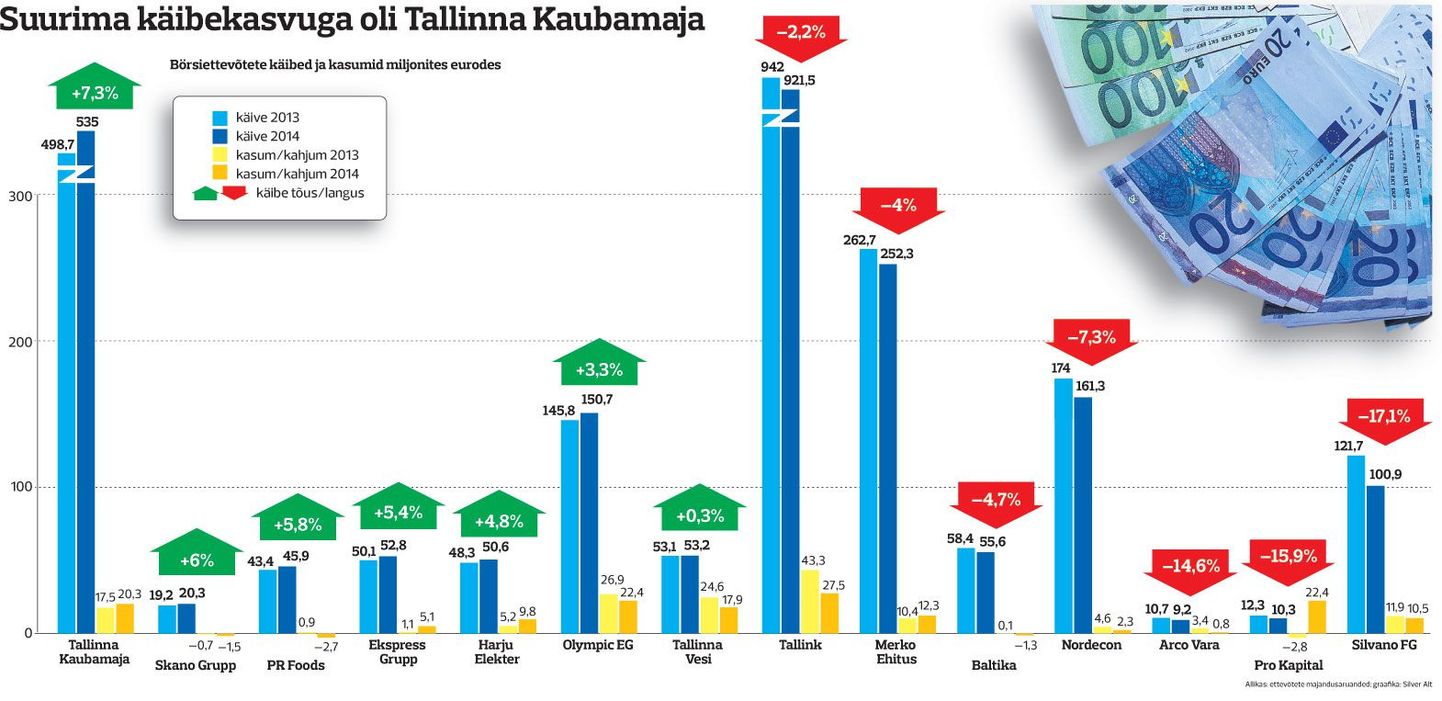
Last year saw a whopping seven of Tallinn Stock Exchange listed companies lose turnover – a half of them. Real estate firm Trigon Properties is basically having no business activity at all. Of the 14, three made losses.

Last year saw a whopping seven of Tallinn Stock Exchange listed companies lose turnover – a half of them. Real estate firm Trigon Properties is basically having no business activity at all. Of the 14, three made losses.
Economists said the year was affected by events in Ukraine and Russia.
«For some more, for some less, but the effects of Ukrainian events and worsening business environment in Russia were felt by many companies listed on Tallinn Stock Exchange, with results impacted,» explained senior LHV economist Joonas Joost. «Hardships thereof weighed very directly on both Baltika (net loss of €1.3m in 2014) and Silvano Fashion Group (net profit shrunk by 18 percent).»
Though Ekspress Grupp served a surprise with above-the-expected year-end profit, the volume of print work for Russian clients decreased. As also admitted by Tallink Grupp, numbers of travellers from Russia have gone down.
Nevertheless, the relatively low results may not be blamed on the Russian crisis alone. With six years from financial crisis, most of the listed companies are yet to reach pre-crisis sales levels. Record turnovers were only managed by two: Tallinna Vesi and Tallinna Kaubamaja.
Though the latter’s profit (€20.3m) was fourth largest in the group’s history, they announced record dividends to shareholders: €16.3m i.e. 40 cents per share. The nice dividend promise gave wings to Tallinna Kaubamaja share to boost it by 5.6 percent, yesterday.
Linked to court case
Tallinna Vesi’s dividend plans are not known as yet, but the company has vowed to raise these according to inflation at least. Last year, the water utility paid 90 per share.
As 2014 profits were €17.9m i.e. 90 cents per share, one might guess the dividend will stay on last year’s level or even come down by a cent or two.
The more so that, as predicted by LHV economists Shana Gavron and Joonas Joost, this year’s profit will probably be negatively affected by arbitral court disputes resulting in above-average fees and legal costs. «Therefore, a too good growth can’t be predicted,» said Mr Joost. «Ergo, the company’s future is mostly linked to the ongoing court dispute end results.»
Tallinna Vesi has sued Estonian Competition Authority for not allowing the water utility to raise tariffs.
The sole record setter of 2014 was Harju Elekter whose profit nearly doubled to €9.8m. The last record profit for the company was €5.5m in 2007. Pursuant to Harju Elekter’s dividend policy, the company pays out a third of the profit; thus, the shareholders are in for a minimum of 18 cents per share. Last year, Harju Elekter paid 10 cents per share.
Harju Elekter CEO Endel Palla promised Äripäev that this year’s dividends would be bigger, but stopped short of specifying the sum. The business daily said LHV predicts 11 cents.
Accounting-wise, profits increased most for the additional-listed Pro Kapital who upgraded its real estate by 3.3 times resulting in €22.3m of profits (in 2013, they suffered a €2.8m loss). The company’s turnover went down 17 percent to €10.3m.
Helped by energy
The other major profit growth befell Ekspress Grupp. The media group’s turnover increased five percent to €52.8m; profits increased by 4.7 times to €5.1m.
As stated above, three of those listed ended in the red: fishery products maker PR Foods (formerly Premia Foods), furniture builder Skano and clothes maker Baltika.
After four years of loss-making, the fashion clothes seller was only able to be slightly profitable for two years. Last year’s loss amounted to €1.26m. In recent history, Baltika has almost yearly been forced to ask extra money from investors. LHV economists say this year’s need depends of the company’s strategy.
«Though the profit in 4th quarter of 2014 was positive news, even this year the continued trouble spots are Russian market and toughening competition on Baltic markets,» said Mr Gavron and Mr Joost.
In the cold economic climate, economists say the major possible positive factors for economies of Estonia and partner states are European Central Bank bond purchasing programme and the low energy prices.
On company level, the results are mostly affected by other enterprise-specific details.
Swedbank’s Baltic shares chief analyst Marek Randma said they think the shares with greatest potential are those of Silvano FG, Ekspress Grupp, Nordecon and Tallink.